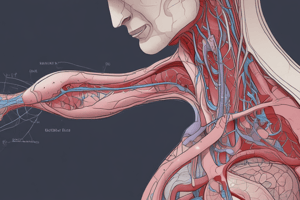Podcast
Questions and Answers
What is the primary function of the kidneys in the human excretory system?
What is the primary function of the kidneys in the human excretory system?
- Filter blood to form urine (correct)
- Transport urine from the bladder
- Secrete hormones for electrolyte balance
- Store urine until excretion
Which component of the excretory system is responsible for storing urine?
Which component of the excretory system is responsible for storing urine?
- Bladder (correct)
- Kidneys
- Urethra
- Ureters
What waste product is primarily excreted in urine and is a result of protein metabolism?
What waste product is primarily excreted in urine and is a result of protein metabolism?
- Lactic Acid
- Urea (correct)
- Uric Acid
- Creatinine
Which disorder involves the gradual loss of kidney function over time?
Which disorder involves the gradual loss of kidney function over time?
How do the kidneys contribute to maintaining homeostasis in the body?
How do the kidneys contribute to maintaining homeostasis in the body?
Flashcards are hidden until you start studying
Study Notes
Human Excretory System
-
Definition: The human excretory system is responsible for removing waste products from the body and maintaining homeostasis.
-
Main Components:
- Kidneys:
- Bean-shaped organs, located on either side of the spine.
- Filter blood to form urine, removing waste and excess substances.
- Regulate water and electrolyte balance.
- Ureters:
- Two tubes that transport urine from the kidneys to the bladder.
- Bladder:
- A muscular sac that stores urine until it is excreted.
- Can hold about 400-600 mL of urine.
- Urethra:
- The duct through which urine is expelled from the bladder.
- Length varies: approx. 20 cm in males, 4 cm in females.
- Kidneys:
-
Functions:
- Filtration: Removing waste products and excess substances from blood.
- Reabsorption: The kidneys reabsorb necessary nutrients (e.g., glucose) from filtered fluid.
- Secretion: Additional waste products are secreted into the urine.
- Regulation: Helps regulate blood pressure, blood volume, and electrolyte levels.
-
Waste Products:
- Urea: Main waste product from protein metabolism; excreted in urine.
- Creatinine: Waste product from muscle metabolism.
- Uric Acid: Product of nucleic acid metabolism.
-
Homeostasis:
- Maintains acid-base balance (pH regulation).
- Regulates blood pressure through the renin-angiotensin system.
- Controls electrolyte levels (e.g., sodium, potassium).
-
Common Disorders:
- Kidney Stones: Hard deposits formed from minerals and salts.
- Urinary Tract Infections (UTIs): Infections affecting any part of the urinary system.
- Chronic Kidney Disease: Gradual loss of kidney function over time.
- Glomerulonephritis: Inflammation of kidney filters (glomeruli).
-
Importance: The excretory system maintains the body's internal environment, preventing the buildup of harmful substances and ensuring proper fluid balance.
Human Excretory System
- The human body's excretory system expels waste products, ensuring proper fluid balance, and maintaining overall internal balance (homeostasis).
- The system includes the kidneys, ureters, bladder, and urethra.
Kidneys
- Bean-shaped organs, located on either side of the spine.
- Filter blood to produce urine, removing waste and excess substances.
- Regulate water and electrolyte balance within the body.
Ureters
- Two tubes transporting urine from the kidneys to the bladder.
- Act as a conduit for urine flow.
Bladder
- A muscular sac that stores urine until it is excreted.
- Stores urine until the body signals its release.
- Typically holds 400-600 mL of urine.
Urethra
- The duct through which urine exits the bladder.
- Male urethra is approximately 20 cm long, while female urethra is approximately 4 cm long.
Functions
- Filtration: The kidneys remove waste and excess substances from the blood.
- Reabsorption: The kidneys reabsorb essential nutrients (e.g., glucose) from the filtered fluid.
- Secretion: Additional waste products are added to urine.
- Regulation: The system controls blood pressure, blood volume, and electrolyte levels.
Waste Products
- Urea: The main waste product from protein metabolism excreted in urine.
- Creatinine: A waste product from muscle metabolism.
- Uric Acid: A product of nucleic acid metabolism.
Homeostasis
- Maintains the body's acid-base balance (pH regulation).
- Regulates blood pressure through the renin-angiotensin system.
- Controls electrolyte levels (e.g., sodium, potassium).
Common Disorders
- Kidney Stones: Hard deposits formed from minerals and salts within the urinary tract.
- Urinary Tract Infections (UTIs): Infections affecting any part of the urinary system.
- Chronic Kidney Disease: A gradual decline in kidney function over time.
- Glomerulonephritis: Inflammation of the kidney filters (glomeruli).
Importance
- The excretory system is essential for maintaining the body's internal environment, preventing accumulation of harmful substances and ensuring proper fluid balance.
Studying That Suits You
Use AI to generate personalized quizzes and flashcards to suit your learning preferences.




